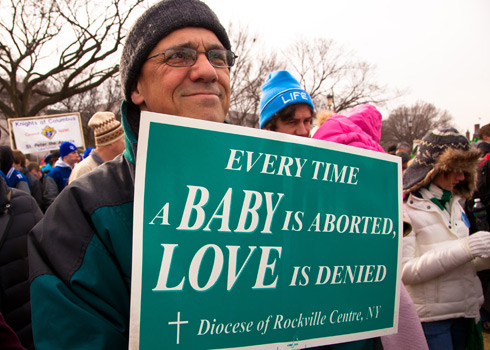The anti-abortion community is defending the controversial abortion funding law in the House from critics by saying that the new language on rape and incest exceptions represent a change in law but not a change in policy. It’s a strong argument — supporters of the bill say the goal is to make permanent the already existing ban on abortion funding in the federal code.
There’s just one problem, according to law professors who spoke with TPM: the argument is entirely false. The House ban’s exceptions for “forcible rape” and incest only under the age of 18 would be a policy shift, they said. A big shift.
Yesterday, National Right To Life Center legislative expert Douglas Johnson told a pro-life website that the House bill would change only the letter of the law regarding abortion. Currently, the Hyde Amendment allows federal Medicaid funds to pay for abortions in the case of rape, incest or the life or health of the mother. The House bill would change that, allowing federal funds to be used for abortions only in the case of “forcible rape” or incest when the victim is under the age of 18. The health exemption would remain.
Johnson contended — incorrectly — that language change would not mean any difference for women seeking Medicaid coverage for their abortions. Statutory rape, he asserted, is already not counted as part of the rape exemption.
“It is true that the new bills would not allow general federal funding of abortion on all under-age pregnant girls — but this is no change in policy,” he told LifeNews. “In falsely claiming that it is a change in policy, the pro-abortion advocacy groups really are engaged in a brazen effort greatly expand federal funding for abortion.”
That’s flat wrong, says Dr. Catherine J. Ross, professor of family law at George Washington University.
“It’s a huge change,” Ross told TPM today. “This is going to have a disproportionate effect on minors.”
“Currently, all acknowledged rape — everything that’s defined as rape — is exempted from the Hyde Amendment provisions,” she added. “It’s true some of the proponents say they’re really not trying to change the law, but those unofficial statements of intent, even if credible, are not binding in the courts.”
Put simply, Ross said, a court is likely to read every word in a statute as “having a purpose.” So the change to add “forcible rape” to the federal ban would suggest a different standard for judging rape in the eyes of the federal funding statute.
“They have to have a reason for making a distinction between ‘forcible rape’ and other rapes,” she said.
So far, that reasoning has been hard to come by — with the exception of Johnson and co-sponsor Rep. Dan Lipinski (D-IL), none of the bill’s sponsors, no one House leadership and none of the other anti-abortion groups have been willing to comment on the changes.









